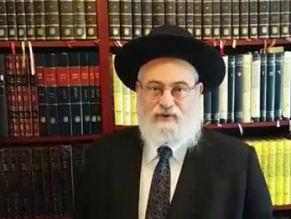|
World Jewish News

According to Rabbi Benjamin Jacobs, Holland's Chief Rabbi, the armed protection of Jewish sites by the military and police officers in Europe is only diverting attention away from rising anti-semitism.
|
Increase in number of anti-Semitic incidents in Holland leads to enhanced sense of insecurity among Dutch Jews
27.04.2015, Anti-Semitism Holland witnessed an increase of 71% in anti-Semitic incidents in 2014 compared to the previous year, a monitor group reported.
According to the annual report of the Center for Information and Documentation on Israel (CIDI), 171 anti-Semitic incidents were recorded in 2014 compared to 100 in 2013.
The report found that people who are recognizable as being Jewish, such as those wearing a kippah, were especially targeted by anti-Semitism, which included verbal abuse and harassment on the streets.
The number of incidents of physical violence doubled, from 3 in 2013 to 6 in 2014.
Approximately half of the anti-Semitic incidents took place during Israel’s Operation Protective Edge against Hamas in Gaza war last summer. Thousands of people demonstrated then in the city of Rotterdam against what some labelled Israel's “genocide in Gaza”. As many as 10,000 people took part in the demonstration against Israel's defensive operation in Gaza, with marchers waving posters reading: "Free Palestine" and "No Dutch support for Palestinian genocide"
The serious increase in the number of incidents in 2014 led to an enhanced sense of insecurity among the Jewish community in the Netherlands, CIDI found, especially in the wake of the attack in the Jewish Museum in Brussels in May 2014, in which four people were killed by an Islamist terrorist, and the threat to the country by jihadists returning from Syria.
The CIDI report also mentioned the failure of police to interfere in anti-Semitic incidents. One example brought by the organization was that of a woman who wanted to report a threat of violence during a party. The police responded by asking whether she had a permit to hold the party.
CIDI also said it was “very worrying that in schools, where citizenship, democracy and respect should be taught, many incidents were reported.” The reported mentioned that there were 15 incidents of anti-Semitic nature in and around Dutch schools in 2014, including one where a Jewish boy was stabbed with a protractor and injured in the stomach.
About 30,000 Jews live in Holland.
According to Rabbi Benjamin Jacobs, the country’s Chief Rabbi, the armed protection of Jewish sites by the military and police officers in Europe is only diverting attention away from rising anti-semitism.
He warned that implementing security measures, while necessary, is akin to taking an aspirin for a headache.
“The soldiers, the police in front of buildings in Holland does not solve the problem,” Rabbi Jacobs says. “If someone has a headache and they take an aspirin, it’s not solving the problem, it’s just pushing away the headache.”
“So how do we solve the problem? Education. We should make sure in schools that children get the right education,” he adds. “There are certain schools where we do not talk about the Holocaust anymore and that should not be tolerated.”
Jacobs, who lives in the city of Amersfoort southeast of Amsterdam, said he faced several anti-semitic incidents, in the last few years, something he said would never have happened two decades ago.
“If I look back, 40 years ago never ever someone could call me a dirty Jew. 20 years ago also not. But slowly we see that it is getting worse,” he deplored.
Despite having insults such as “dirty Jew” and “Hitler” shouted at him, bricks thrown through his windows and cars regularly beeping him, he revealed that he has always experienced a large amount of local support following the attacks.
“I’m not scared by nature but I’m worried about it. This intolerance is no good. Do I see a lot of darkness? Yes. I also see a lot of light. I don’t forget the flowers. I don’t forget the support of the people.”
While considering the idea of moving to Israel, Rabbi Jacobs is defiant that his decision to stay or leave Holland will not be dictated by threats directed towards him and the Jewish community.
“I am Dutch, generation after generation, if I want to leave here it is my decision. It is to be made by me, myself and not by terror. I do not want to be the captain leaving the first ship. Besides the fact that I decide, I am a Rabbi and I am here for my people,” he stressed.
He added : ‘’We must show the world we are not scared and we don't accept that we need to hide and to make sure that no one can see that we're Jewish."
A new campaign has been recently launched by the Brussels-based European Jewish Association (EJA) in Europe to don a kippah to fight anti-Semitism.
EJA's Director General Rabbi Menachem Margolin called on non-Jewish Europeans to wear Jewish symbols and film themselves walking down the street to show their opposition to rising anti-Semitism.
“The idea is to get as many non-Jews as possible to wear Jewish symbols and show solidarity, and that they are a part of the silent majority that is not anti-Semitic. The idea is to do like the ice bucket challenge and get thousands to publish the videos on Facebook and Twitter,” he said.
by Maureen Shamee
EJP
|
|
